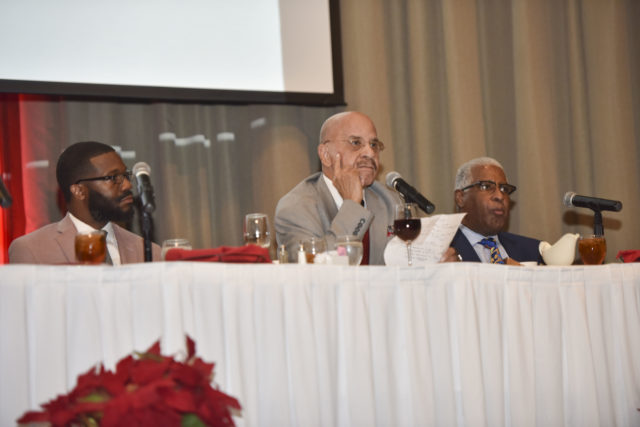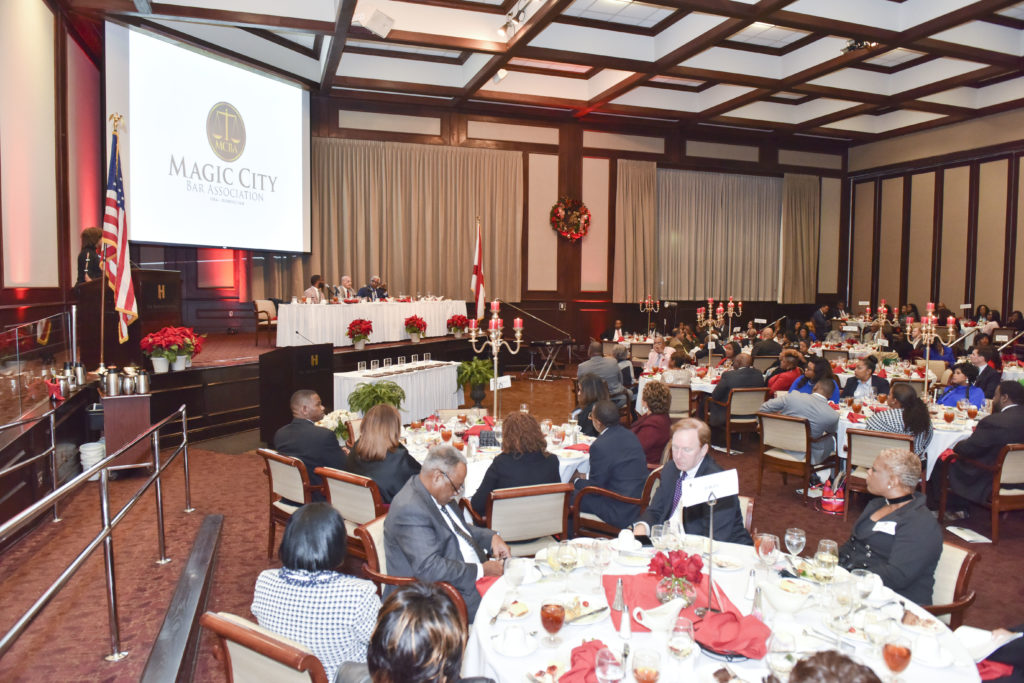
By Ameera Steward
The Birmingham Times

A wealth of political, institutional, and legal knowledge was on display during the recent Magic City Bar Association (MCBA) Annual Scholarship Banquet, where three of Birmingham’s African-American mayors reflected on the past and looked toward the future.
Mayor Randall Woodfin (elected in 2017) and former mayors Richard Arrington Jr. (1979–1999) and William Bell Sr. (2010–2017) served as panelists for the banquet, for which the theme was “Reflections on the Past, Vision for the Future.”
The MCBA supports and encourages students preparing to make contributions to the community through the legal profession. Every year, the group awards scholarships to minority students attending Alabama law schools.
MCBA Banquet Chair Kimberly Bell, an attorney with Balch and Bingham LLP, said it’s important to “reflect on the past in Birmingham, what Birmingham has been through, and what the different mayors have done to build Birmingham up”—and what’s being done to make it better.
Diandra Debrosse Zimmerman, a principal with Zarzaur Mujumdar and Debrosse, served as moderator for the panel. After introducing the mayors, she asked, “What do you consider the most significant accomplishment of your term as mayor?”
Arrington, 84, said, “We doubled the size of the city from 60 square miles to 140 square miles. We put in place a record number of jobs. … When we began, the unemployment rate in this city was somewhere in the double digits, and the city’s economy and steel production were all but dead. …. We diversified that economy in the face of flight from the city, … [and] gave it a smaller tax base. When I left [office], [the city had a] $100 million surplus.”
Another accomplishment is what Arrington calls “social transition, … [which was] about creating biracial communication in the city. … We created a diverse labor force in city government to lead the way with changes in Birmingham.
“We transformed the police department in Birmingham. … There were only 60 cities in the entire [nation] that had accredited police departments, and the city of Birmingham was one of those. I consider that a significant change or accomplishment.”
Arrington added that he was honored to serve as mayor “at a time in Birmingham’s history when it was undergoing a major transition, … when its black community was getting a voice in government.”
Bell’s Accomplishments
Asked about his major accomplishments, Bell, 69, pointed out that he was elected at the height of the recession, when the city faced a $78 million deficit.
“Things had become stagnant, [and] there was a dark cloud over the mayor’s office. … People just did not have hope in the city of Birmingham,” he said. “I felt at the time that it was my job to instill in the public a sense of confidence that the city of Birmingham was moving in the right direction. … We started with the process of trying to get people to come back to the city.”
Bell also noted how the city was viewed by outsiders.
“I set about on the task of changing the image of Birmingham, which, first of all, began at home,” he said. “We put in place a number of measures, so people could see that the city was being run properly, that we were doing things that were in the best interest of the city. … I wanted to make sure we presented that new image to the rest of the country, not by denying our past but by showing what our current state was all about. That Birmingham was an open city for everyone to express themselves in a positive way. … We created that image on a national [level].”
The next step was spreading that message internationally, sharing Birmingham’s legacy of human and civil rights worldwide, he said. One key accomplishment was the designation of the Birmingham Civil Rights District as a national monument, which was one of the last proclamations signed by President Barack Obama before leaving office.
“That would put us on the map as a destination point for people around the world to come and see the birthplace of the destruction of segregation, … which means hundreds and thousands of dollars have the opportunity to come into this city through people visiting our city. That’s the best way to build up your tax base,” said Bell, who also noted his efforts to redefine downtown Birmingham.
“Now you see people everywhere. You see people living downtown. You see people opening business downtown. That brings financial stability to the city … to begin doing those projects that are so necessary in the communities.”
Woodfin’s Initiatives
Woodfin, 37, who marked his first year in office on November 29, said his most important initiative revolves around Birmingham’s neighborhoods.
“Day one of year two has the same priority as last year: neighborhood revitalization. It was the number-one priority then, and it’s the number-one priority now. It’s all about adopting the core values of customer service, efficiency, effectiveness, transparency, and accountability … [and delivering] services to improve the quality of life for our residents.”
Woodfin, who is also a lawyer, said he also wants to address blight in the city, moving toward affordable, single-family housing and investing more in infrastructure, “paving streets; [repairing] curbs, sidewalks, and lights; [picking up] trash.”
He noted that in his first year, the city has torn down 294 structures that were beyond repair.
“We want to protect the residents and the value of their homes. … We want to make sure we send the message that blight is unacceptable in our city and … move aggressively in addressing that because that’s one of the [main things] residents complain about.”



